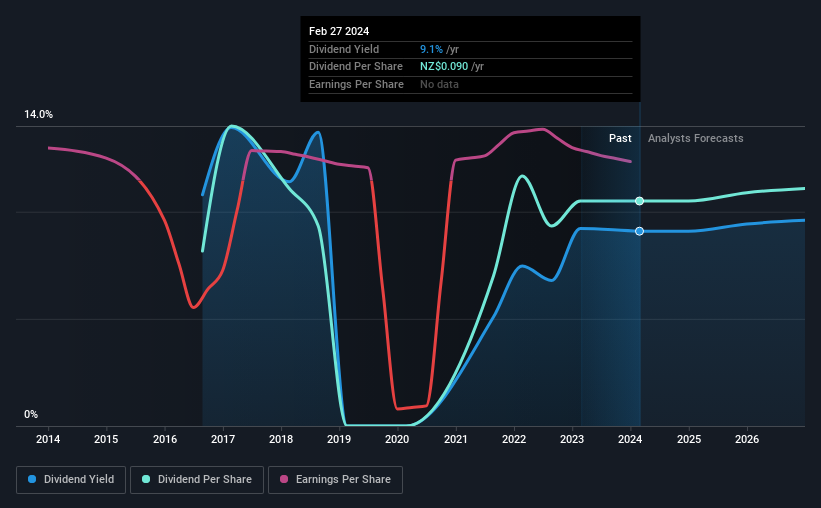NZME (NZSE:NZM) Has Affirmed Its Dividend Of NZ$0.0706
The board of NZME Limited (NZSE:NZM) has announced that it will pay a dividend of NZ$0.0706 per share on the 20th of March. Based on this payment, the dividend yield on the company's stock will be 9.1%, which is an attractive boost to shareholder returns.
View our latest analysis for NZME
NZME Doesn't Earn Enough To Cover Its Payments
We like to see robust dividend yields, but that doesn't matter if the payment isn't sustainable. Before making this announcement, NZME's dividend was higher than its profits, but the free cash flows quite comfortably covered it. Generally, we think cash is more important than accounting measures of profit, so with the cash flows easily covering the dividend, we don't think there is much reason to worry.
Over the next year, EPS is forecast to expand by 67.9%. Assuming the dividend continues along recent trends, we think the payout ratio could reach 96%, which probably can't continue without putting some pressure on the balance sheet.
NZME's Dividend Has Lacked Consistency
It's comforting to see that NZME has been paying a dividend for a number of years now, however it has been cut at least once in that time. Due to this, we are a little bit cautious about the dividend consistency over a full economic cycle. The annual payment during the last 8 years was NZ$0.07 in 2016, and the most recent fiscal year payment was NZ$0.09. This means that it has been growing its distributions at 3.2% per annum over that time. Modest growth in the dividend is good to see, but we think this is offset by historical cuts to the payments. It is hard to live on a dividend income if the company's earnings are not consistent.
The Dividend's Growth Prospects Are Limited
With a relatively unstable dividend, it's even more important to evaluate if earnings per share is growing, which could point to a growing dividend in the future. Earnings per share has been crawling upwards at 2.7% per year. So the company has struggled to grow its EPS yet it's still paying out 129% of its earnings. As they say in finance, 'past performance is not indicative of future performance', but we are not confident a company with limited earnings growth and a high payout ratio will be a star dividend-payer over the next decade.
In Summary
Overall, it's nice to see a consistent dividend payment, but we think that longer term, the current level of payment might be unsustainable. In the past, the payments have been unstable, but over the short term the dividend could be reliable, with the company generating enough cash to cover it. We would probably look elsewhere for an income investment.
Companies possessing a stable dividend policy will likely enjoy greater investor interest than those suffering from a more inconsistent approach. However, there are other things to consider for investors when analysing stock performance. As an example, we've identified 3 warning signs for NZME that you should be aware of before investing. Looking for more high-yielding dividend ideas? Try our collection of strong dividend payers.
Have feedback on this article? Concerned about the content? Get in touch with us directly. Alternatively, email editorial-team (at) simplywallst.com.
This article by Simply Wall St is general in nature. We provide commentary based on historical data and analyst forecasts only using an unbiased methodology and our articles are not intended to be financial advice. It does not constitute a recommendation to buy or sell any stock, and does not take account of your objectives, or your financial situation. We aim to bring you long-term focused analysis driven by fundamental data. Note that our analysis may not factor in the latest price-sensitive company announcements or qualitative material. Simply Wall St has no position in any stocks mentioned.

 Yahoo Finance
Yahoo Finance 
